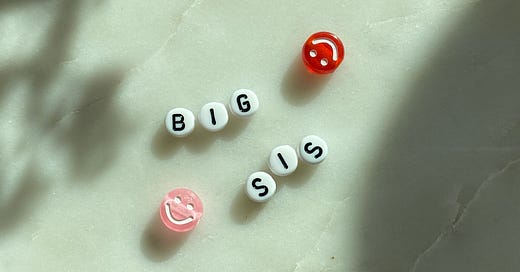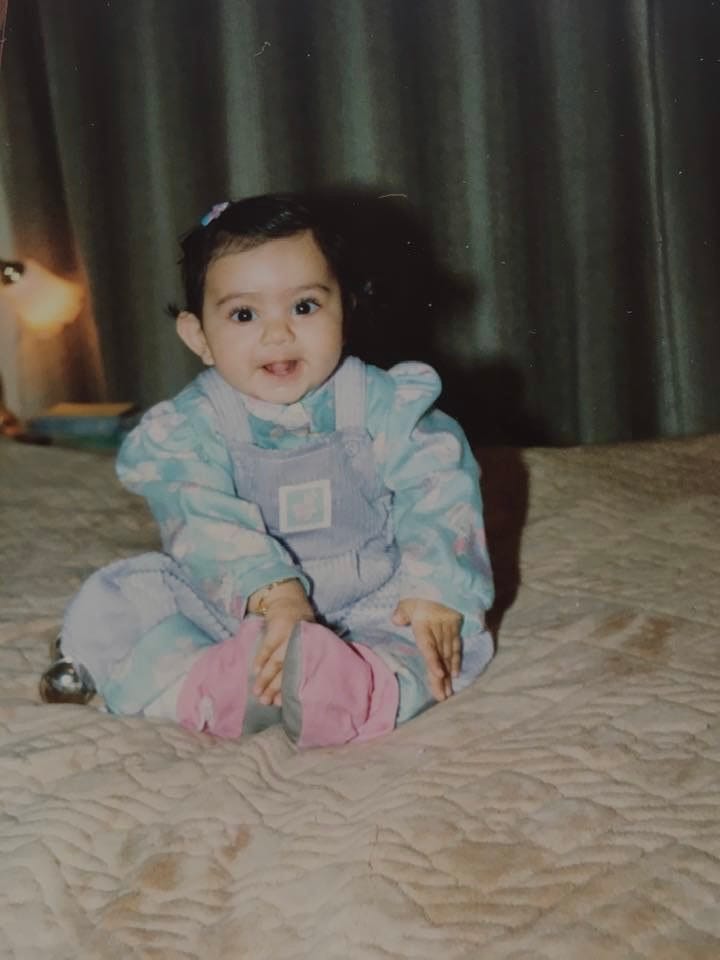I was born first. My sister second. I had no say in the matter and that’s just how it was. The way of the world and all that, you know? Some have one sibling; others have many more. Some are only children and there we go. So what if you were born first, second, third or last. It is what it is, and there’s nothing more to it than that.
And yet, despite the factual nature of it all there is something I think about being the oldest; and perhaps being the oldest daughter, that deserves just a little more thought.
A couple of months ago I remember coming across some videos on Instagram usually created by young women talking quite candidly about the hidden pain and solitude that accompanies being not just an oldest child but being an oldest daughter. As I watched these reels and read through the thousands of comments from many other first born daughters, I realised a kind of kinship. Not of identical experience but of just enough shared similarity to shape an identity or unity of sorts between myself and these other first born women.
For example, some of the sentiments expressed by the women in these videos included feeling like an extra parent to younger siblings, protecting and supporting them in a whole variety of ways. Lucy* described the way she was often applauded for being “mature” as a child simply by virtue of having to look after her younger sibling. In another video, Mira* talks openly about how being an older daughter has become a key part of her identity, reinforced by her parents who emphasised her role as the oldest sibling. She also described how she feels this role plays a large part in her now adult desire to please her parents and show them that she is achieving. Rachel* described the heavy and painful responsibility that being the oldest daughter caused her while growing up. The need to check up and know where and what her siblings were doing sometimes gave her a reputation of being intrusive and a bit annoying. She (and others) reflected on how being the oldest and importantly female resulted in wildly different experiences from those who may be older and instead, male. One woman explained the way being female and the oldest meant her whole family expected her to be more caring and take on certain emotionally toned responsibilities (e.g., being the one to call relatives, to send birthday cards and check in with family generally) that her older male cousins were never expected to do. In another post a young woman described how being an older sister is like “an unpaid internship for the rest of your life.” To which somebody commented “but at least interns get credit.”
Growing up as the oldest daughter in my family, there were expectations that accompanied my status as first born. That I should be serious, sensible and steady. If I behaved in a silly way it was more likely to be perceived as naughty and deserving of a telling off than if it was my younger sister. In fact, for my younger sister being a bit silly was almost expected and treated as an endearing quality often described as ‘quirky’, while I instead as ‘difficult’. I also wonder how this perception may have differed had I been born an oldest male. Would my naughtiness instead have been experienced as ‘boisterousness’ and simply a part of belonging to the other sex? When I look back and reflect on this time it comes as no surprise that these expectations were more heavily held perhaps by my dad (than my mum), a man who himself is an oldest son. Now well into my adult life these sibling differences no longer seem so relevant as my sister I have happily balanced out for the most part. If anything, she has become a welcome third parent to me. But it does make me wonder. The expectations- both intended and not- that we place on young minds can have wildly different outcomes. And may play an essential part in shaping who we become, who we grow up to be.
*
The term ‘eldest daughter syndrome’ is not one that I’m familiar with at least not from a clinical point of view. That’s because it’s not a psychiatric diagnosis but instead a socially driven term that’s been increasingly used (mainly on social media). It’s also tricky to define officially, with different ideas on what makes up the core of it. A sort of consensus is that the term relates to the way the oldest daughter (or oldest female sibling) picks up the mental load for the family (i.e., being on top of planning events or outings, ensuring family relationships are equitable and fair), doing emotional labour for the family and in some cases undertaking domestic labour too. All of this is tasked only to the oldest daughter and other siblings aren’t expected to do the same. It is without doubt an enormous level of responsibility for any child or teen. While it’s unclear how much people who identify with the term feel their adult life is affected by these experiences, a deep sense of unfairness remains.
The idea that your position among siblings or birth order might have lasting impact on your life course, has been around for a while. In the 1800s, Francis Galton analysed a sample of English scientists and observed that firstborns were overrepresented in this intelligent lot. He suspected that oldest sons in this case enjoyed special treatment by their parents allowing them to thrive intellectually. Half a century later, Alfred Adler extended these ideas to personality traits where much of the controversy lies. From his perspective, firstborns were privileged, but also burdened by feelings of excessive responsibility and a fear of ‘dethronement’ and so more likely to score highly on neurotic traits. He also expected later-borns to be overindulged by their parents and lack social empathy. In the 1990s Frank Sulloway revisited these ideas and suggested that later borns are more likely to rely on social support, become more sociable and therefore more extroverted. In this theory siblings compete for parental favour and firstborns try to please by acting as surrogate parents for their siblings, a behaviour that might increase the personality trait of conscientiousness. He also predicted that firstborns would be more anxious, and quicker to anger while later borns more depressed, vulnerable and self-conscious. I’m curious, what do you think?
Over the years while some studies found support for Sulloway’s hypotheses, others did not. This inconsistency was put down to differences in study design, with one big factor being whether people under study were actually real siblings to each other or simply unrelated 1st, 2nd, 3rd- borns etc. It’s a problem as studies that compare unrelated people can’t account for other factors that might influence personality development- like genetics or socioeconomic status. What’s interesting is that even when studies did compare people alongside their real siblings, evidence in favour of Sulloway’s hypotheses were found. The trouble is these studies were very small in size and only collected information from one sibling about not just their own experiences but also those of their siblings (rather than asking each sibling for themselves). A major problem given a person’s existing beliefs could easily skew the findings.
In the last 10 years or so there’ve been two large and much better designed studies that have tested these ideas. One of them used a really large sample (more than 10,000) of people from the US, UK and Germany and used both related and unrelated siblings for comparison. They also used independent self-reports of personality from each sibling and took account of factors like sibling group size and age at time of assessment. Together with the other study, which was the largest on birth order and personality, the conclusion was pretty clear. Birth order is not an important factor for personality development.
*
So science says birth order isn’t that relevant in determining who we are. But then again, this research (like many others) tells us absolutely nothing about the female experience within it- one that certainly seems and feels important to many. And while some studies have accounted for differences in shared factors (like genetics) how well they account for subtle but equally powerful ones like parenting style and cultural variation within different families is unclear.
I’m not so quick to discount birth order effects. At least not from a more nuanced point of view. I recently met a young oldest daughter who told me how unfair her experiences are compared to that of her brother. She gave many examples and told me this: “In my house family is important and the older you get the more responsibility you have. Being the first daughter, I was old I have to take care of everybody around me. That everyone looks up to me and I have to be perfect, a kind of role-model. The reality is it’s unfair and really tough on my mental health. It’s like everyone else is allowed to make mistakes, just not me.”
~
Questions:
Are you a first born? Second or other-born? Or an only child perhaps?
Are you a daughter or son?
Do you feel your birth order affects the way you were raised or your personality?
Let me know in the comments or by replying to this email. I’d love to know.






Very observant. I am the third of 3 girls. The camera broke before I was born and was never repaired so there are maybe 2 baby pictures of me while my sisters still have albums. I got the short end of the photo-stick. As the youngest child I didn't get "all the attention" as most assume. My oldest sister-- the eldest-- was my protector and we are still very close. Great piece. Adorable picture!
Very Interesting... anecdotally talking to other older siblings (male and female) they do seem to lean towards the “responsible” side of things (and think their siblings are not!). There is a common belief that they default to being serious / hard working, get away with less, end up doing more but get less attention for good work or preempting problems (and conversely get more attention when things don’t go well!) ... or so I’ve heard anyway 😉🙈😇.
Is it that being the oldest has an inherent social “respect” (respect your elders, etc) so the learnt feeling is toward being respectable (in whatever way that means) ? So if you are silly you are then immediately aware or told that you are not living up to being a model citizen (as you are - by default - a role model or could be to a younger sibling).
And this would vary wildly based on the belief you have learned about what respect means or what it is to protect your younger sibling.
Does it come from not being used to having attention shared when this new baby comes along and the first thing you see is this little thing being protected and being told your the older brother/sister and you need to take care of this tiny helpless things. As you never saw your self as a baby, this fragile little thing is a completely new experience and something that must seem to control your parents and yet be be controlled by them...
Hmmm. Not sure how you could ever really test for this given the limitless variables of experiences and unwritten expectations!!
But jolly interesting indeed!!!